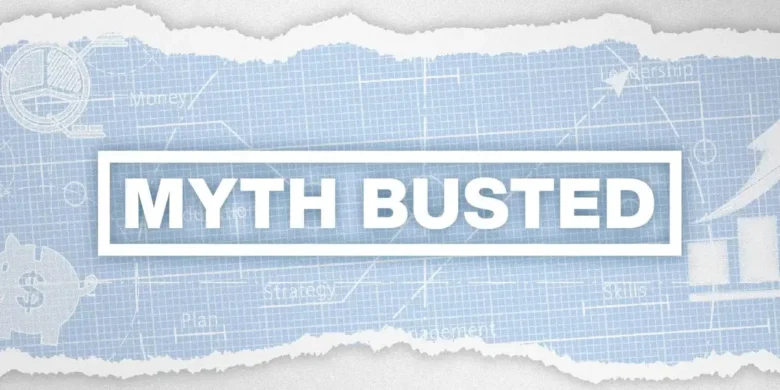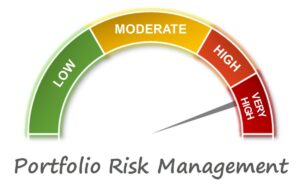Investing can be scary, especially when you’re surrounded by false beliefs that can directly mislead your decisions. These beliefs can subtly limit your financial development and prevent you from reaching your true potential. Regardless of your investing experience or whether you’re just starting, making smart decisions requires you to let go of these false beliefs. This article will uncover the truth behind the 10 biggest investing myths and help you take control of your financial future with confidence and clarity.
1. Only the Rich Can Invest:
One of the most persistent misconceptions about investing is that investing is a privilege reserved for the wealthy elite. This simply isn’t true. Thanks to technology and websites like Robinhood and Acorns, anyone can start investing with as little as $5. These websites have lowered the barrier to entry and made it possible for people of all incomes to gradually build wealth. Investing is about investing money regularly and letting compound interest work, not about starting with a huge fortune.
2. Investing Requires You to be an Expert:
Many people hesitate to start investing because they think they need a financial education or a thorough knowledge of the markets to be successful. While it is helpful to know the basics, you don’t have to be an expert. Index funds or ETFs are excellent investment options for beginners who don’t need much knowledge. They offer diversified market exposure with low risk. Automated systems such as robo-advisors can also guide consumers in creating a customized portfolio based on their risk tolerance and goals. The
3. Stock Market Is Too Risky:
Many people stay away from investing because they think the stock market is a risky investment. While the volatility of specific stocks can be high, investing over the long term can significantly reduce risk. For decades, stock market returns have remained stable despite short-term fluctuations. By focusing on diversified investments and maintaining a long-term perspective, you can reduce risk and grow your portfolio over time.
4. Real Estate is a Safe Investment:
Real estate is often considered a foolproof strategy for wealth creation. However, this misconception reduces the complexity of real estate investing. The difficulty of real estate investing can arise from factors such as location, market trends, and unexpected costs. Unlike stocks, real estate requires a lot of initial capital and ongoing management costs. Although real estate investing can provide good returns, it is not necessarily safer than other investment methods. Before entering the real estate market, it is important to thoroughly research and understand the market.
5. Investing is About Waiting for the Best Time:
One of the biggest misconceptions about investing is timing the market. Missed opportunities often result from waiting eagerly for ideal market conditions. Effective investing is more about timing the market than timing it. Start investing early, and compound interest will pay off, even if the market fluctuates in the short term. Long-term success depends on continuous investing, regardless of market conditions.
6. Past Performance Predicts Future Results:
Another common belief is that the past performance of a stock or fund guarantees future success. While past performance can provide some information, it is not a good predictor of future results. Performance can change unpredictably due to market conditions, competition, and economic changes. Investors should consider sector trends, fundamentals, and growth prospects in addition to historical data before making a judgment.
7. Diversification is Not Necessary:
Some investors believe that the ideal investment strategy is to invest all of their money in one investment that performs well. This strategy is dangerous because it can lead to large losses if that investment performs poorly. Diversification can reduce the overall risk of a portfolio by spreading funds across multiple asset classes, sectors, and regions. The allocation of stocks, bonds, and other assets should be reasonable so that even if one investment declines, other assets can help balance your portfolio.
8. Check Out the Guides to Popular Stocks:
Although sometimes unreliable, “stock tips” from friends, social media, or self-proclaimed “gurus” can be appealing. Often, these recommendations are based more on speculation than on careful research. Blindly following these recommendations can lead to significant losses. Instead, your investment choices should be based on your goals, risk tolerance, and carefully researched data. A disciplined approach often trumps impulsive, hasty decisions.
9. Investing is a Get-Rich-Quick Scheme:
Many people start investing with unrealistic fantasies of getting rich quickly. Reality, good investing requires discipline, patience, and long-term planning. While some cases of huge gains are rare, investing can help people build wealth gradually by investing regularly, planning carefully, and avoiding chasing short-term gains.
10. You Should Only Invest in What You Know:
When it comes to investing, the advice to “stick to what you know” can be limiting. While it’s important to understand your investments, limiting yourself to familiar sectors or assets can leave you missing out on opportunities for diversification and expansion. Working with a financial advisor or exploring new markets can open you up to investments that align with your overall financial goals.
Breaking Down Investment Myths to Unlock Wealth Creation:
Anyone seeking financial independence and long-term growth must avoid these investment pitfalls. Understanding the truth behind these misconceptions can help you make smarter, more confident financial decisions. Remember: The goal is growth, not perfection. If you’re feeling overwhelmed or unsure, start small and consult a trusted source of information or a financial advisor.
Get started today, whether it’s by opening your first investment account or broadly diversifying your portfolio. The sooner you take action, the sooner you’ll develop better financial habits. Investing is an important tool; with the right attitude and skills, you can use it to secure a better, more stable future.
FAQs:
1. How much money do I need to start investing?
Sites like Robinhood or Acorns let you start investing with as little as $5. Starting early and investing regularly is the secret.
2. How can I reduce the risk associated with investing?
Risk can be reduced through diversification, long-term planning, and investing in low-cost index funds or ETFs.
3. Can I invest without understanding the stock market?
Yes! Many solutions, including robo-advisors and beginner-friendly platforms, are designed to allow you to invest without much market knowledge.
4. Is real estate always a better investment than stocks?
Not necessarily. Real estate carries risks, including fluctuations in value depending on location, and requires a significant initial investment. Both options have pros and cons, depending on your financial goals.
5. When should you start investing?
It’s best to start investing right away. Waiting for ideal market conditions often leads to missed opportunities. Prioritize long-term development, not market timing.




